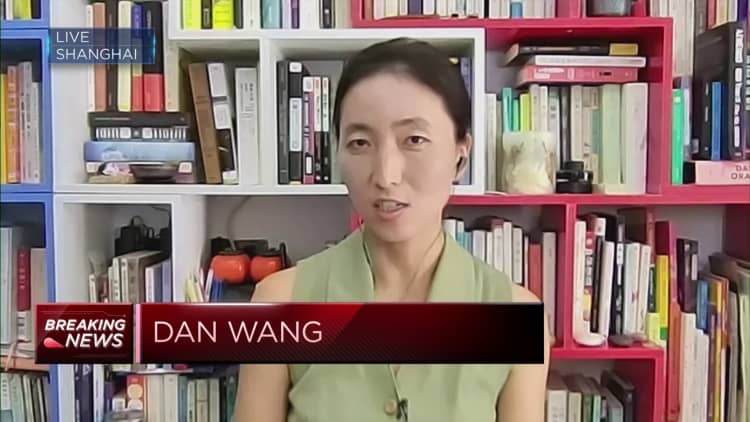
Property investment in China slid nearly 8% in the first half of the year, official data showed Monday, marking a deepening decline for a sector that accounts for up to a quarter of the world’s second-largest economy.
The National Bureau of Statistics said the sector will gradually stabilize as the broader economy recovers, and is shifting from high-speed development to stable development in the medium to long term.
The country’s property sector is struggling to emerge from a credit crisis after the government cracked down on its debt levels in August 2020. Years of exuberant growth has led to the construction of ghost towns where supply outstrip demand, as developers look to capitalize on the desire for home ownership and property investment.
The 7.9% drop in investment for January to June was steeper than the 7.2% drop reported for January to May. Last month, China’s second-largest developer China Vanke said the sector is “indeed under pressure in the short term” and that the situation is “worse than expected,” according to a CNBC translation.
“This year, due to major drag from the housing markets and consumption, we actually didn’t see the kind of rebound in broader economic growth,” Dan Wang, chief economist at Hang Seng Bank (China), told CNBC’s “Street Signs Asia” on Monday. China second-quarter growth came in at 6.3% from a year before and 0.8% from the quarter before, underwhelming market expectations yet again.
“Of course it justifies a little bit bigger… fiscal and monetary stimulus, but if you look at the whole year, even with 6.3% growth in Q2, we can still reach 5% annual growth without a big problem,” she added.
China property investment slid nearly 8% in the first half of the year, official data showed Monday, pointing to a deepening decline in investment for a sector that accounts for about a quarter of the world’s second-largest economy.
Future Publishing | Future Publishing | Getty Images
She noted that if the decline in housing investment does not worsen from its current levels, fixed asset investment would likely account for about 1% to 1.5% of annual growth overall. A “natural rebound in consumption” would contribute about 2% to 2.5%, she said.
“Overall picture is kind of rosy. It’s not difficult to reach the annual target, then there’s not much incentive for the central government to extend the stimulus,” Wang said.
Targeted support
On Monday, data also showed new housing starts, in terms of area, decreased 24.3% in the first half of the year from a year ago, while completed housing stock rose nearly 19%.
The sector has been hard hit by a lingering credit crisis the last two years, with a rash of incomplete housing projects as a result of developers being strapped for cash, prompting some buyers to stop mortgage payments.
The broader economic slowdown has also led many to save the capital that could have been put toward housing purchases and investment.
Last Monday, the People’s Bank of China and National Financial Regulatory Administration extended loan relief for some developers, stressing their aims were to ensure homes under construction could be delivered — a signal that more targeted support may be forthcoming.
“To counteract persistent growth headwinds (property slowdown and confidence deficit in particular), we expect more (targeted) easing measures in coming months, with a focus on fiscal, housing and consumption, although the magnitude of stimulus should be smaller than in previous easing cycles,” Goldman Sachs economists said in a Monday note after the data release.
Market watchers are looking to the Politburo’s meeting later this month — which traditionally examines the country’s year-to-date economic performance — for more guidance on policy stimulus. China’s leaders have signaled in recent weeks they are likely to be judicious and targeted in their policy support.

